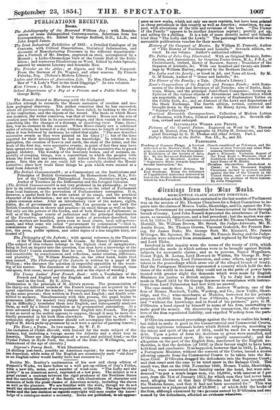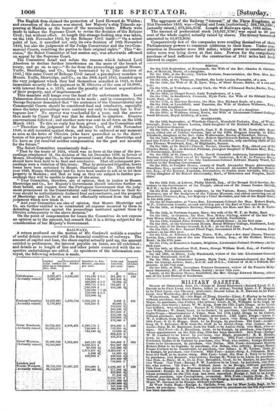61ming5 Irina 4 . t Vanko,
MERCANTILE CLAIM AGAINST PORTUGAL.
The first defeat which Ministers sustained in the last seseirm of Parliament was on the motion of Mr. Thomas Chambers for a Select Committee to in- quire into the claims of Means. Yuille, Shortridge, and Co. against the Por- tuguese Government for compensation for losses incurred by them through breach of treaty. Lord John Russell deprecated the interference of Parlia- ment, as unusual, dangerous, and a bad precedent ; but the motion was car- ried, by 126 to 74. The Committee consisted of Mr. Thomas Chambers, Mr. Horsfall, Mr. William Brown, Mr. Strutt, the Judge-Advocate, Mr. IL Austin Bruce, Mr. Thomas Greene, Viscount Goderich, Sir Francis Bar- ing, Sir James Duke, Mr. George Butt, Mr. Kinnaird, Mr. James McGregor, Mr. Spooner, Mr. Dunlop. Sir Francis Baring and the Judge- Advocate were relieved from attendance, and replaced by Sir George Grey and Lord Elcho.
Involved in this inquiry were the terms of the treaty of 1654, which prescribed the mode in which actions were to be brought against British subjects for mercantile claims ; and as to persons, Signor Magalhaes, Count Tojal, M. Leitao, Lord Howard de Walden, Sir George H. Sey- mour, Lord Aberdeen, Lord Palmerston,, and some others, appear as par- takers in the proceedings which arose out of the alleged breach of treaty. Had the Portuguese Ministers represented a country which held the des- tinies of the world in its hand, they could not in the pride of power have treated with greater slight the demands which were made by English Ministers for justice to British subjects. Up to July last a demand made in March 1851 by Sir George Seymour in compliance with instruc- tions from Lord Palmerston had met with no answer. The case stands thus. ID. 1826, Mr. Andrew Wardrop, one of the firm of Messrs. Murdoch, Yuille, Wardrop„ and Co., (now Yuille, Short- ridge, and Co.,) wine-merchants at Madeira, borrowed for his private purposes 10,000/. from Maned Jose d'Oliveira, a Portuguese subject and "without the knowledge and in fraud of his partners," gave to M. cr Oliveira a bond signed by himself in name of his firm, undertaking to make goad the money. On discovering the transaction, the other mem- beim of the firm repudiated liability, and expelled Wardrop from the part.: D'Oliveir.a. commenced proceedings against the firm to realize his Watt, but failed to make it good in the Conservatorial and Commercial Courts, the only legitimate tribunals before which British subjects, wording to, the intent and spirit of the act of 1654, could be sued for a mercantile debt. Upon a point of form the decisions so given were annulled, and D'Oliveira commenced anew. He was equally unsuccessful ; and the allegation on the part of the English firm, sanctioned by the English au- thorities, is that the decision (of 1838) in their favour ought to have been held final and conclusive. It so happened, however that in 1835, L. Leitao, a Portuguese Minister, without the consent of the Cortes, issued a decree allowing appeals from the Commercial Courts to be taken into the Re- lace° Civil. D'Oliveira dragged the defendants into the Supreme Court; and that court sent the case to be tried anew in the Itelacao CiviL Mae result was, that on the 10th November 1840, Messrs. Yuille, Shortridge, and Co., were exonerated, from liability under the bond, but were °ow, demned "to pay a much larger sum, viz. 10,0004, witk interest a Spar. cent, from the 31st of January 1813, for which sum they had never been sued, idleging that at that date D'Oliveira had that sum invested in the Madeira house, and that it had not been accounted for This was tantamount to a kidgment debt of -25;000K ; of which debt the boolut of the firm, although examined by two persona named by D'Oliveita and one named-by the defendants, afforded no evideastaewbetseteri- " The English firm claimed the protection of Lord Howard de 'Walden; and execution of the decree was stayed, her Majesty's ship Trinoulo ap- pearing at 74adeira as the bearer of the necessary order. Efforts were made to induce the Supreme Court to revise the decision of the Relaeao Civil ; but without effect At length this strange-looking step was take; on the 10th November 1842, by the Relaeao Civil itself-" On a minor point of law, it annulled not only its own decision of 10th November 18401 but aid. the judgments of the Judge Conservator and the two Com- mercial Courts, remitting the parties to their original rights." This "de- cision," the Select Committee of last session say; was afterwards affirmed on appeal by the Supreme Court.
The Committee detail and refute the reasons which induced Lord Aberdeen to decline further interference on the score of the breach of treaty, and go on to say-" So far from the proceedings against Messrs. Yuille, Shortridge and Co. being terminated by it, [the decision of
1842,] this same Shortridge, of Itelacao Civil issued a peremptory mandate to Messrs. Yuille, Shortridge, and Co., on the 30th April 1845, founded upon the very judgment which they had themselves annulled in 1842, to find immediate security for the payment to M. Oliveira of the sum of 10,0001., with interest from A. D. 1813, under the penalty of instant sequestration of their property, and of imprisonment."
This mandate still hangs over the head of the unfortunate firm. Lord Palmerston directed representations to be made ; and in consequence, Sir George Seymour demanded that "the sentences of the Conservatorial and Commercial Courts should be considered final and conclusive, especially since the latter proceedings were contrary not only to treaty but to Por- tuguese law." No answer was vouchsafed for a year, and the answer then made by Count Tojal was that he declined to interfere. Evasive conversations followed ; and another note was sent in all form on the 15th March 1851. To this no reply has been given ; and the Committee add -" Therefore the judgment of the Relacao Civil, of 10th November 1840, is still recorded against them, and may be enforced at any moment as soon as the heirs of Oliveira (who have quarrelled as to the distri- bution of his property) shall agree to proceed ; and thus Shortridge and Co. have as yet received neither compensation for the past nor security for the future."
The Select Committee unanimously find-
"That by the treaty of 1654, which was in force at the time of the pro- ceedings complained of, the decision of the 1st December 1838, in favour of Messrs. Shortridge and Co., in the Commercial Court of the Second Instance, should have been held to be final and conclusive. That all subsequent pro- ceedings were a violation of this treaty. That by protracted litigation, heavy losses have been sustained by Messrs. Shortridge and Co. That since the year 1840, Messrs. Shortridge and Co. have been unable to sell or to let their property in Madeira ; and that DI long as they are subject to further pro- ceedings they will be unable to dispose of the same. "Your Committee, therefore, are of opinion, that in justice to Messrs. Shortridge and Co., her Majesty's Government should interfere further on their behalf, and require from the Portuguese Government that the judg- ment pronounced in the Conservatorial and CoMmercial Courts in their fa- vow should be authoritatively declared final and conclusive and the propertv of Shortridge and Co. be at once and effectually released from the illega.l
• judgment which now binds it.
"And your Committee are also of opinion, that Messrs. Shortridge and Co. are further entitled to be reimbursed all expense incurred by them in defending themselves against the proceedings instituted against them by Oliveira subsequently to the above decision."
On the point of compensation for losses the Committee do not express an opinion as to the amount, but remark that it is a fitting subject for the consideration of her Majesty's Government.



























 Previous page
Previous page